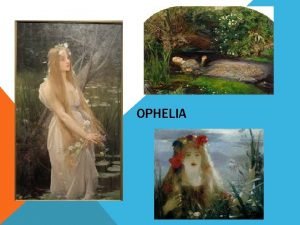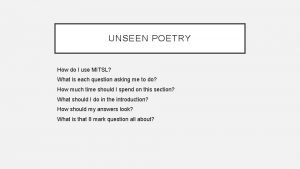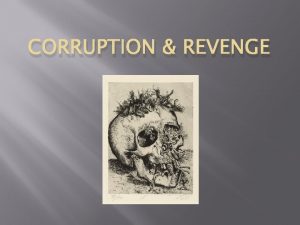Ophelia Hamlet Ophelia Daughter of Polonius Sister of


![[Enter OPHELIA] • How now, Ophelia! what's the matter? OPHELIA • O, my lord, [Enter OPHELIA] • How now, Ophelia! what's the matter? OPHELIA • O, my lord,](https://slidetodoc.com/presentation_image_h2/2eaa9e464fc6cfba9baaf9fdf86b74a0/image-3.jpg)



- Slides: 6

Ophelia Hamlet

Ophelia • Daughter of Polonius, Sister of Laertes and possible wife of Hamlet. • Ophelia doesn’t feature much in the play but her role is to show “Hamlet's warped view of women as callous sexual predators, and the innocence and virtue of women” – Shakespeare-online. com • In the beginning of the play, Ophelia is quiet and interacts minimally with other characters but over time she becomes insane, much more so than Hamlet.
![Enter OPHELIA How now Ophelia whats the matter OPHELIA O my lord [Enter OPHELIA] • How now, Ophelia! what's the matter? OPHELIA • O, my lord,](https://slidetodoc.com/presentation_image_h2/2eaa9e464fc6cfba9baaf9fdf86b74a0/image-3.jpg)
[Enter OPHELIA] • How now, Ophelia! what's the matter? OPHELIA • O, my lord, I have been so affrighted! LORD POLONIUS • With what, i' the name of God? OPHELIA • My lord, as I was sewing in my closet, • Lord Hamlet, with his doublet all unbraced; • No hat upon his head; his stockings foul'd, • Ungarter'd, and down-gyved to his ancle; • Pale as his shirt; his knees knocking each other; • And with a look so piteous in purport • As if he had been loosed out of hell • To speak of horrors, --he comes before me. LORD POLONIUS • Mad for thy love? OPHELIA • My lord, I do not know; • But truly, I do fear it. Act 2 Scene 1 • In this passage, Ophelia joins Polonius and proceeds to tell him how she has been frightened by Hamlet. She describes his indecent clothing and appearance. She describes his facial expression as “piteous” and “out of hell”. Ophelia fears that Hamlet’s madness is caused by his love for her. • Imagery – Shakespeare uses a lot of imagery to give the audience a clear view of what Ophelia saw. Words such as foul’d, ungarter’d, pale, knees knocking. • Negativity – Shakespeare uses many negative words in this passage. He uses words such as fouled, pale, unbraced, piteous and affrighted to shock the audience.

LORD POLONIUS • What said he? OPHELIA • He took me by the wrist and held me hard; • Then goes he to the length of all his arm; • And, with his other hand thus o'er his brow, • He falls to such perusal of my face • As he would draw it. Long stay'd he so; • At last, a little shaking of mine arm • And thrice his head thus waving up and down, • He raised a sigh so piteous and profound • As it did seem to shatter all his bulk • And end his being: that done, he lets me go: • And, with his head over his shoulder turn'd, • He seem'd to find his way without his eyes; • For out o' doors he went without their helps, • And, to the last, bended their light on me. Act 2 Scene 1 • In this section Ophelia tells Polonius about how Hamlet grabbed her and let out a ‘sigh so piteous and profound’. Hamlet’s actions seem to confuse her but it is obvious that he is very much in love with her as he cannot take his eyes off her. • Shakespeare has written this section very literally as he describes Hamlet and Ophelia’s interactions.

Act III, Scene I O, what a noble mind is here o'erthrown! 150 The courtier's, soldier's, scholar's, eye, tongue, sword; The expectancy and rose of the fair state, The glass of fashion and the mould of form, The observed of all observers, quite down! And I, of ladies most deject and wretched, That suck'd the honey of his music vows, Now see that noble and most sovereign reason, Like sweet bells jangled, out of tune and harsh; That unmatch'd form and feature of blown youth Blasted with ecstasy: O, woe is me, 160 To have seen what I have seen, see what I see! This scene is set in one of the various chambers of Elsinore Castle. Theme of this extract is that of confusion, anger, and disbelief. At this point in the plot, Hamlet has just verbally abused Ophelia is realising that Hamlet is no longer the “jewel of the country” and she claims that he doesn’t speak musically anymore, he speaks harshly out of tune. She uses various similes when discussing the attributes that Hamlet used to have which was the grace of a gentleman, the wit of a scholar, and the strength of a soldier.

Act IV, Scene V KING CLAUDIUS How do you, pretty lady? OPHELIA Well, God 'ild you! They say the owl was a baker's daughter. Lord, we know what we are, but know not what we may be. God be at your table! KING CLAUDIUS Conceit upon her father. OPHELIA Pray you, let's have no words of this; but when they ask you what it means, say you this: Sings To-morrow is Saint Valentine's day, All in the morning betime, And I a maid at your window, To be your Valentine. Then up he rose, and donn'd his clothes, And dupp'd the chamber-door; Let in the maid, that out a maid Never departed more. The theme of this section of the play is Ophelia has begun to go a little bit crazy and she has started to mention her father which is known as Claudius says: “Conceit upon her father. ” In fact, Ophelia alludes to the idea of her father’s death by mentioning that the baker’s daughter was turned into an owl for refusing Jesus’ bread. This would explain that Polonius was not a good practicing Christian and was therefore punished.










